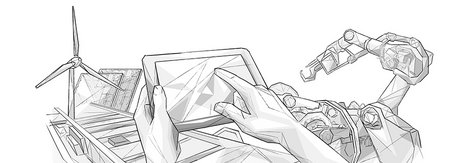Only those who rely on modern automation technologies will be at the front in the digital race

Saxony-Anhalt – here engineers have the best equipment
The longest production line which was ever developed and built by Rubicon Gummitechnik und Maschinenbau GmbH in Halle (Saale) is nearly 90 metres long. It operates in South Korea. The company specialises in the production of extrusion systems for the entire rubber processing industry and provides customised solutions worldwide to manufacturers of technical rubber products as well as the tyre and cable industry. Profiles from systems made in Halle seal the windows of cars and even the glass window facades of skyscrapers around the world. Moreover, Rubicon provides extrusion systems for silicone products such as catheter tubes utilised in the field of medicine. “Production lines have been delivered in more than 60 countries. In our special field – machinery and systems for the production of hoses in the automotive industry – we are the number one in Germany”, says managing director Dr Christian Köhler, who helped to establish Rubicon Gummitechnik und Maschinenbau GmbH in the early 1990s. The share of exports is meanwhile at about 80 percent.
Primarily medium-sized enterprises such as Rubicon GmbH make Saxony-Anhalt a high-performance region in the sphere of mechanical and plant engineering. 150 years of experience constitute the basis for the most important of all industries in the federal state. Over 27,000 employees in the 338 companies compiled a turnover of about 4.1 billion euros in 2015.
Formerly a centre of heavy mechanical engineering, today the core competence of high-tech production for producers and suppliers in the mechanical and plant engineering industry is in demand worldwide. Automation and digitalisation are key topics in this connection. That is also why Christian Köhler helped to establish another company – Rubicon Automation GmbH – in 2013. The company provides control systems for Rubicon extruders, but also develops and builds special conveyor technology, for instance for the food industry, and true to scale robot technology.
Saxony-Anhalt will also rely on the competence of its mechanical and plant engineering companies in the future. In 2014, the state government decided to implement the “Regional Innovation Strategy Saxony-Anhalt 2014 to 2020”. The core of this strategy is to utilise and to further develop specialisation advantages for intelligent, sustainable and socially inclusive growth. For this purpose Saxony-Anhalt is oriented towards so-called “lead markets”, in which societal, social and ecological needs will have an effect on demand. One of these markets of the future is called “energy, mechanical & plant engineering and resource efficiency”. As one of the leading federal states in the utilisation of renewable energies, in this market of the future Saxony-Anhalt takes advantage of the existing technological advantage with regard to regenerative energy plants. Goal: regenerative technologies, highly flexible production processes and a resource-sparing recycling economy become systemically interlinked.
In the lead market energy, mechanical & plant energy and resource efficiency, companies work together with universities and scientific institutions in several networks and clusters. This includes the Cluster Sondermaschinen- und Anlagenbau (special machinery and plant engineering), the Spitzencluster Kreislauf- und Ressourcenwirtschaft (recycling and resource management) or the Innovation Cluster ER-WIN (intelligent, energy-efficient and resource-efficient regional value chains in industry) with the regional “Wachstumskern Fluss-Strom Plus” (“Growth Core Stream-Current Plus”). In this alliance, 19 companies and seven research institutions develop state-of-the-art mobile hydroelectric power plants for streams with low gradients. “We want to establish and expand Saxony-Anhalt’s and Central Germany’s technology and product leadership in Europe and also worldwide”, says Mario Spiewack. The engineer heads the river hydroelectric power alliance based at Otto von Guericke University Magdeburg, whose members have already realised specific projects on the Bode and Elbe rivers in Saxony-Anhalt. For instance, a vector research experimental vehicle is being used in the Elbe River together with SIBAU Genthin GmbH & Co. KG and the Fraunhofer Institute for Factory Operation and Automation (IFF). It serves as an experimental base for companies and research institutes as well as technicians and ecologists. The common goal is the ecologically compatible, and at the same time, the economic utilisation of hydroelectric power.
AEM-Anhaltische Elektromotorenwerk Dessau GmbH also takes advantage of opportunities which the diverse research institutes in Saxony-Anhalt offer. The special purpose machine manufacturer has already provided more than 12,000 machines such as generators for hydroelectric power and shipbuilding as well as engines for mining, hoisting and construction machines as well as testing facilities in over 70 countries around the world. Despite this success, managing director Reiner Storch sees the compelling necessity to redevelop and further develop products in order to be able to survive in the global market. “With major developmental projects we accordingly fall back on the support of universities, associated institutes, the Fraunhofer Institute for Factory Operation and Automation (IFF) and other institutes, because we do not have the manpower for this purpose, and naturally with developmental components with which we do not have the necessary know-how, because it is not part of our core competence. One example is a currently proposed project on the subject of conditioning monitoring”, says Storch.
The Federal State of Saxony-Anhalt relies on the lead market energy, mechanical & plant engineering and resource efficiency. The prerequisites are good, especially due to the dense research landscape related to mechanical engineering. In the state there are also universities specialised in young engineers, where about 11,000 students are currently enrolled in engineering.
For example, you can gain insights into the efficiency of the industry at the HANNOVER MESSE. Ten small and medium-sized enterprises will be presenting application examples for Industry 4.0, unique solutions for networking, new products as well as trendsetting system solutions at the joint stand of the Federal State of Saxony-Anhalt in Hall 4/G05.
More information is available at www.invest-in-saxony-anhalt.com/hannover-messe-2017
Author: Michael Falgowski
